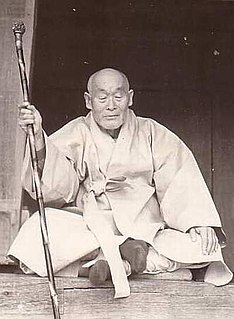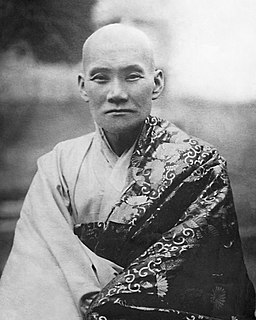Related Research Articles

Korean Buddhism is distinguished from other forms of Buddhism by its attempt to resolve what it sees as inconsistencies in Mahayana Buddhism. Early Korean monks believed that the traditions they received from foreign countries were internally inconsistent. To address this, they developed a new holistic approach to Buddhism. This approach is characteristic of virtually all major Korean thinkers, and has resulted in a distinct variation of Buddhism, which is called Tongbulgyo, a form that sought to harmonize all disputes by Korean scholars. Korean Buddhist thinkers refined their predecessors' ideas into a distinct form.

A bhikkhu is an ordained male monastic ("monk") in Buddhism. Male and female monastics are members of the Buddhist community.

Stephen Batchelor is a British author and teacher, writing books and articles on Buddhist topics and leading meditation retreats throughout the world. He is a noted proponent of agnostic or secular Buddhism.

The Jogye Order, officially the Jogye Order of Korean Buddhism, is the representative order of traditional Korean Buddhism with roots that date back 1200 years to the Later Silla National Master Doui, who brought Seon and the practice taught by the Sixth Patriarch, Huineng, from China around 820 CE. The name of the Order, Jogye, was adopted from the name of the village where Patriarch Huineng's home temple, Nanhua Temple, is located,.
The Pratimokṣa is a list of rules governing the behaviour of Buddhist monastics. Prati means "towards" and mokṣa means "liberation" from cyclic existence (saṃsāra).
Martine Batchelor, a former Jogye Buddhist nun, is the author of several books on Buddhism currently residing in France. She and her husband, Stephen Batchelor, work mostly in the United Kingdom and occasionally in the United States. In addition to writing books, she leads meditation groups with her husband that incorporate aspects of Zen, vipassanā, and Tibetan Buddhism. Batchelor also blogs frequently for the U.S.-based Tricycle: The Buddhist Review. She studied Jogye Zen Buddhism for ten years at Songgwangsa with her former teacher Master Kusan Sunim, being ordained as a nun in 1975. Batchelor served as Kusan's interpreter on speaking tours of the United States and Europe from 1981 to 1985, the year she left monastic life, married Stephen Batchelor, and returned to Europe. There she became a member of Sharpham North Community and served as a guiding teacher at Gaia House, both of which are based in Devon, England. She has also led a Buddhist studies program at Sharpham College in Totnes, Devon. MB speaks English, Korean, and French and can read Chinese characters.
Hyunoong Sunim is a Korean Zen master as well as a Taoist Master born in South Korea. He is a disciple of Ku San Sunim and entered Songgwangsa Buddhist Monastery in 1966. From 1966-1969 he studied in the Sutra Hall of Songgwangsa, studying Buddhist sutras and philosophy. In 1970 he began his studies of Zen philosophy and Zen meditation. After ten years of training in Zen Meditation halls, he felt that the traditional zen hall training was not helping his practice. He then lived for three years as a wandering beggar, begging for his food and places to sleep. This gave him the opportunity to let go of everything he was holding on to. It was during this period that he finally realized what correct zen practice really is, and felt that he was ready to study under a great master. He then went to Master Jeon Gang Sunim in YongHwaSa Temple in Incheon, South Korea and began studying under him.
Jiyul is a South Korean Buddhist nun belonging to the Jogye Order, the largest in Korean Buddhism. She garnered national and international attention for her environmental activism, which has included dramatic and controversial methods such as a series of fasts-to-the-death. She is also attributed with likely being the founder of South Korea's national ecological movement due to the attention and largest amount of environmental controversy surrounding her Green Resonance movement, the biggest seen in South Korea.
The Taego Order or Taego-jong is the second largest order in Korean Seon, the Korean branch of Chan Buddhism.

Kobongsoensanim, the 77th Patriarch in his teaching lineage, was a Korean Zen master.
Zen master is a somewhat vague English term that arose in the first half of the 20th century, sometimes used to refer to an individual who teaches Zen Buddhist meditation and practices, usually implying longtime study and subsequent authorization to teach and transmit the tradition themselves.

The Venerable Samu Sunim (1941), born Sam-Woo Kim, is a Korean Seon sunim of the Jogye Order. He received Dharma transmission from Zen Master Weolha Sunim in 1983. He has taught primarily in Canada and the United States, having opened centers in Toronto, New York City, Ann Arbor, Michigan and Chicago, Illinois as well as Mexico City.

Hyobong Hangnul (1888—1966) was a Korean Jogye Seon master who was the former head of the Jogye Order. The master of the late Kusan Sunim, Hyobong was the guiding teacher of several temples in Korea—including Songgwang-sa and Haein-sa. Stephen Batchelor has called him, "One of the most remarkable Buddhist teachers of this century in Korea." Hyobong was also the first Korean individual to serve as a judge for the Japanese Imperial government, though he resigned his position after being troubled with having sentenced a man to death. Having told no one of his resignation, he took to selling toffee in rural towns and eventually came to ordain as a sunim under Sŏktu Sunim. Hyobong went on to live as a traveling monk, visiting monastery after monastery for many years. He died in the posture of zazen while at P'Yoch'chung monastery in 1966.
Pohwa Sunim is the head monk of the Young Pyung Sa International Zen Center in South Korea.

Seon or Sŏn Buddhism is the Korean name for Chan Buddhism, a branch of Mahāyāna Buddhism commonly known in English as Zen Buddhism. Seon is the Sino-Korean pronunciation of Chan an abbreviation of 禪那 (chánnà), which is a Chinese transliteration of the Sanskrit word of dhyāna ("meditation"). Seon Buddhism, represented chiefly by the Jogye and Taego orders, is the most common type of Buddhism found in Korea.
Sakyadhita International Association of Buddhist Women is a 501(c)3 nonprofit organization founded in 1987 at the conclusion of its first conference and registered in California in the United States in 1988. Sakyadhita holds an international conference every two years, bringing together laypeople, nuns, and monks from different countries and traditions around the world.
Zen Master Daewon Moon Jae-hyeon is a Korean Zen master in South Korea. A disciple of Zen Master Jeongang, he received Dharma transmission from his teacher and thereby becoming the 78th patriarch in the Dharma Lineage of the Buddha in 1962.

Daehaeng Kun Sunim was a Korean Buddhist nun and Seon (禪) master. She taught monks as well as nuns, and helped to increase the participation of young people and men in Korean Buddhism. She made laypeople a particular focus of her efforts, and broke out of traditional models of spiritual practice, teaching so that anyone could practice, regardless of monastic status or gender. She was also a major force for the advancement of Bhikkunis (nuns), heavily supporting traditional nuns’ colleges as well as the modern Bhikkuni Council of Korea. The temple she founded, Hanmaum Seon Center, grew to have 15 branches in Korea, with another 10 branches in other countries.

Hanam Jungwon was a Korean Buddhist monk and Seon master. He was also the spiritual head(宗正) of what was to become the modern Jogye Order of Korean Buddhism. He was the Dharma disciple of Gyeongheo Seongu, and the Dharma brother of Woelmyeon Mangong.

Ven. Pomnyun Sunim is a Korean Buddhist monk and a Seon master renowned as an author, a Dharma teacher, and for his humanitarian work. He is also a social activist, leading various movements, such as ecological awareness campaigns and the promotion of human rights, as well as working toward world peace and the eradication of famine, disease, and illiteracy. In recognition of his efforts and achievements, Pomnyun Sunim was a recipient of the Ramon Magsaysay Award for Peace and International Understanding in September 2002.
References
- ↑ Daehaeng Sunim (2007). No River to Cross: Trusting the Enlightenment That's Always Right Here. Wisdom Publications. ISBN 978-0-86171-534-3. OCLC 133465561.
- ↑ Kwan, Okyun (2003). Buddhist and Protestant Korean Immigrants: Religious Beliefs and Socioeconomic Aspects of Life. LFB Scholarly Publishing. p. 125. ISBN 1-931202-65-6. OCLC 56995147.